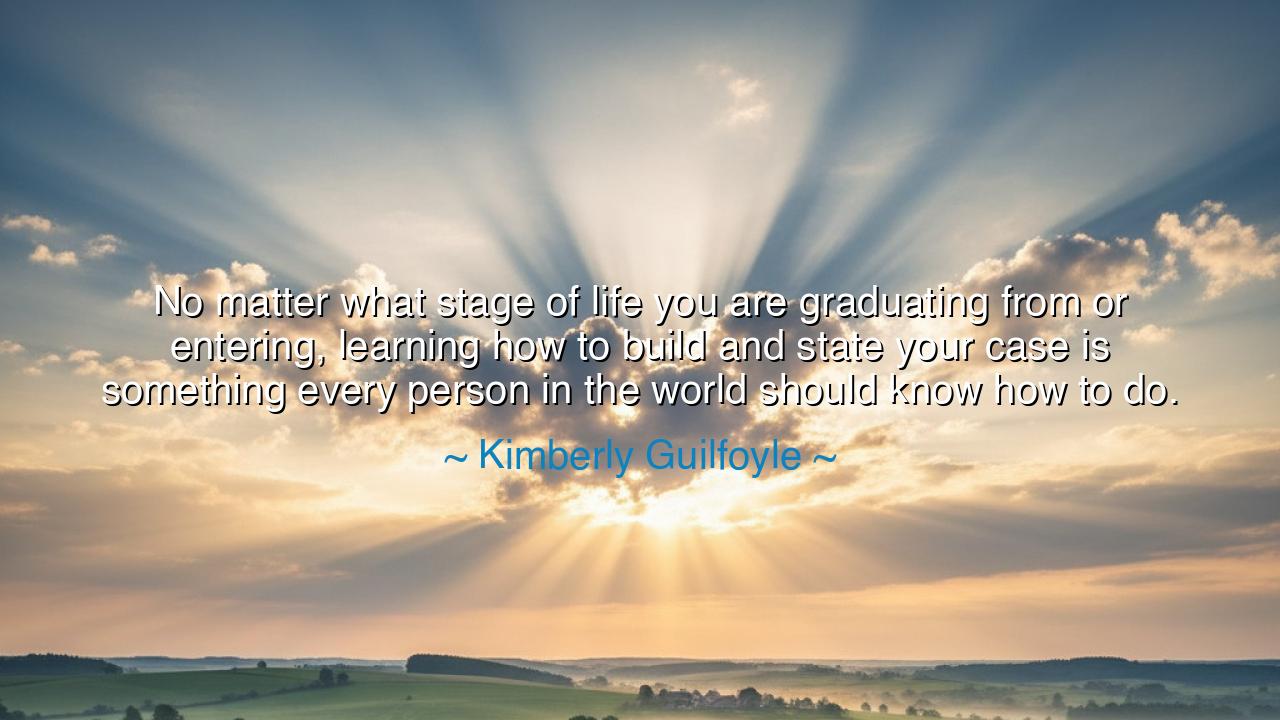
No matter what stage of life you are graduating from or entering
No matter what stage of life you are graduating from or entering, learning how to build and state your case is something every person in the world should know how to do.






“No matter what stage of life you are graduating from or entering, learning how to build and state your case is something every person in the world should know how to do,” said Kimberly Guilfoyle, a woman forged in the fires of public discourse, law, and leadership. Her words, though wrapped in the language of modern counsel, carry the timeless wisdom of the ancients — the call to speak with purpose, to reason with clarity, and to defend truth not with pride, but with conviction. In them we hear the voice of one who knows that to be human is to stand before the world and make one’s case — before others, before fate, and even before one’s own conscience.
From the beginning of civilization, those who could build and state their case became the shapers of destiny. In the marketplaces of Athens, in the courts of Rome, and in the councils of kings, it was not always the strongest who prevailed, but the one who could speak wisely, who could turn thought into persuasion and conviction into command. Words have always been the architects of empires, the guardians of justice, and the wings of change. To learn how to speak and reason, therefore, is to arm oneself with the oldest and most powerful instrument of civilization — the power of the human voice guided by truth.
Kimberly Guilfoyle’s wisdom was born from such a world — one of debate, of persuasion, of standing one’s ground before the gaze of others. As a prosecutor, she learned that justice depended not only on what one knew, but on how one conveyed it. To “build your case” is not merely to argue; it is to order one’s thoughts, to ground emotion in reason, and to clothe truth in words so that it might be seen and heard. Every person, she reminds us, must one day do the same — whether defending an idea before the world, a dream before doubt, or a principle before pressure.
Consider the story of Socrates, the ancient philosopher who faced death for the sake of his beliefs. When brought before the Athenian court, he did not plead for mercy; he stated his case calmly and truthfully. He reasoned not to save his life, but to uphold his integrity. His speech, recorded by Plato, has outlived his judges and echoed through millennia, reminding humanity that the ability to speak one’s truth is not merely a skill — it is an act of courage, a declaration of the soul’s freedom. Socrates showed that the one who can reason well, even in chains, is freer than the one who cannot speak truth even in liberty.
To build and state your case, then, is more than an act of persuasion — it is a form of self-mastery. The one who learns to organize their thoughts learns also to discipline their emotions. The one who learns to speak with clarity learns also to see with clarity. Such a person moves through life not as a reed tossed by the winds of opinion, but as a tree rooted in understanding. Whether in moments of triumph or in the courts of hardship, the skill of articulation grants strength, dignity, and direction.
Yet this art is not reserved for the orator or the judge; it belongs to all. A parent must build their case when teaching a child. A worker must state their case when striving for fairness. A friend must speak wisely when healing misunderstanding. Even the heart must make its case before the mind when choosing love or faith. Thus, communication and conviction are the twin pillars upon which all human harmony rests. The one who learns this art, Guilfoyle reminds us, carries within them a key to every door life presents.
Let this truth, therefore, be passed to all who walk the road of growth: learn to speak your truth well. Study not only words, but meaning. Listen before you speak; understand before you argue. Let reason guide your passion and empathy temper your pride. Build your case not to defeat others, but to uplift understanding. For the voice that can persuade is the same voice that can heal — and the heart that can articulate itself clearly is the heart that can lead.
So remember, O seeker of wisdom, that every stage of life is a new court, and you must learn to state your case before it — not with arrogance, but with courage, not with noise, but with truth. Those who master this ancient art become architects of their fate. For words, when born from wisdom, do not merely pass through the air — they shape the world itself.






AAdministratorAdministrator
Welcome, honored guests. Please leave a comment, we will respond soon